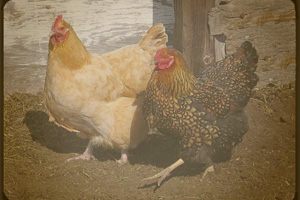Research: The human-chicken relationship

A project is being set up in the hopes of unearthing the history behind our 8,000 year relationship with our beloved chicken. This has ruffled feathers with taxpayers questioning the cost of this study.
Researchers from Bournmouth University, as well as the universities of Durham, Nottingham, Leicester, Roehampton and York will examine when and how quickly chickens were domesticated across Europe, as well as their “cultural significance” in a £1.5m (€1.78m) project funded by The Arts and Humanities Research Council.
Dr Mark Maltby, principle investigator for the project, said: “This is a fantastic opportunity to work with a team of high international esteem drawn from a wide range of disciplines that includes genetics, cultural anthropology, history and archaeological science. “We are united by our mutual research interests in how chickens and people have interacted in the past and the present.”
The study will use archaeological records, as well as metrical and DNA analysis of modern and ancient chicken bones, to trace the development of different breeds. Results of the research will be displayed in museums and other venues across the country and there are also plans to display information in butchers’ shops.
The project is due to begin early next year and will be completed in 2017 – to coincide with the “year of the rooster” – and is entitled: “Cultural and Scientific Perceptions of Human-Chicken Interactions.” But the Taxpayers Alliance (TA), an organisation that campaigns for prudent tax spending, said it was money not well spent.
“This is frankly an absurd sum of money to spend on what appears to be a ridiculous study, and the amount doled out certainly isn’t chicken feed,” said Robert Oxley, campaign director at TA. “Given the limited budget and important challenges facing the UK, research like this should be way down the pecking order for taxpayer funded grants.”
Source: FWI












